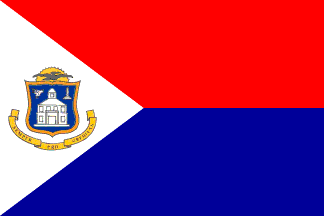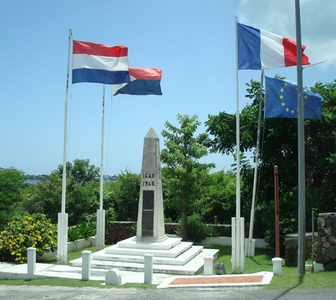
image by Mark Sensen, 14 December 2003

Last modified: 2014-05-29 by zoltán horváth
Keywords: netherlands antilles | antilles | st. maarten | saint martin | philipsburg | pelican | sage | sint maarten |
Links: FOTW homepage |
search |
disclaimer and copyright |
write us |
mirrors

image by Mark Sensen, 14 December 2003
Official Name: Country of Sint
Maarten
Capital: Philipsburg
Location: Caribbean
Government Type: Constitutional Monarchy, Overseas Country of
Kingdom of the Netherlands
Flag adopted: 13 June 1985
Coat of arms adopted: 17 November 1982
ISO Code: SX
See also:
The flag of Sint Maarten was adopted 13 June 1985. It is red
over blue with at the hoist a white triangle with the
coat-of-arms (adopted 17 November 1982). These show on a blue,
orange bordered shield the Court House in Philipsburg. Above the
shield a sun with a flying pelican. Below the shield a yellow
scroll with in blue the motto "SEMPER PROGREDIENS". I'm
not sure what the other items on the shield are. To me they look
like a cluster of fruits, and some sort of pole/monument?
Mark Sensen, 19 July 2000
The Encyclopedia of Flags [zna99]
has this text:
'The colors are those of the flag of the Netherlands. The arms
show an old courthouse, a bouquet of yellow sage (the national
flower), and a silhouette of the monument honoring Dutch-French
friendship and the unity of both parts of the island. The orange
border symbolizes loyalty to the ruling Dutch house of
Oranje-Nassau. The crest is formed by a yellow disc which
represents the sun, and a grey silhouette of a pelican in flight.
The motto in Latin, "Semper Progrediens" means
"Always Progressing".
Jarig Bakker, 20 July 2000
Album des Pavillons [pay] shows a
close-up of the shield, and there are some minor differences with
your image:
- the bird is filled in grey (also reported by Jarig quoting
Znamierowski)
- the monument is also filled in grey - the building in the
center is outlined in grey, and has a window in its upper part -
the plant is green (leaves) and white (flowers?) - the sun is
outlined in black - the orange border of the shield is also
outlined in black
Ivan Sache, 20 July 2000
This island is split between the Netherlands Antilles and
Guadeloupe, which is a French DOM. Sint Maarten has a flag
similar to the Philippine wartime flag, but with a coat of arms
instead of the sun and stars. Saint-Martin maybe has a flag - the
"cocktail glass" design.
Perhaps the Saint-Martin flag alludes to the Sint Maarten flag?
- both flags are blue, red, red and yellow
- both flags have a Y design
- the yellow semi-circle in the Saint-Martin flag could reply to
the sun (rising or setting) in the Sint Maarten flag.
Ole Andersen, 21 September 2000
Image according to Album 2000 [pay00]
- I don't have official specifications of this flag. According
information provided to me by Christopher Southworth, the
coat-of-arms has a height of 2/5th of the flag height, and the
white triangle reaches to 4/9th of the flag length.
Mark Sensen, 14 December 2003
According the results of the referendum held in June 23, 2000,
in Sint Maarten (the Netherlands part of the Caribbean island of
Saint Marten), this territory is becoming a "new country
within the Kingdom of the Netherlands", in other words, Sint
Maarten is seceding from Netherlands Antilles. This is taking
place on nest 1 June 2002. Everybody know how the Sint Maarten
flag is. I have no news if it will change.
Juan Manuel Gabino Villascán, 26 Febuary 2002
Although there was a majority for a "status aparte"
in the (consulting) referendum, and there have been some talks I
think with the rest of the Netherlands Antilles, I never heard
the new status was granted >However, to be sure I mailed the
Dutch Ministry of the Interior and Kingdom Relations and a
newspaper on the Neth. Antilles. When I receice an answer I will
forward it.
Mark Sensen, 27 Febuary 2002
I don't have an answer from the ministry yet. But I received
one from the newspaper Amigoe at Curaçao, and they don't know
anything about it. I also got an answer from Jos Poels who is in
contact with a journalist working for a Dutch newspaper in
Curaçao. He wrote it's very unlikely a Status Aparte ever will be
given.
Mark Sensen, 1 March 2002
Yahoo!News wrote:
Netherlands Antilles parties hammer out government agenda ahead
of swearing in Parliament (Mon Mar 25, 1:26 PM ET).
PHILIPSBURG, St. Maarten - Two months after general elections,
Netherlands Antilles political parties on Monday were drafting
the final version of a new government agenda that could feature
calls for more sovereignty for St. Maarten.
The Dutch territory on five Caribbean islands will swear in its
new Parliament on the main island of Curaçao on Tuesday morning,
with the 22 members choosing a new chairman to head the Central
Government. During Jan. 18 elections, the three contending
parties in St. Maarten were agreed on achieving "separate
status" within the Kingdom of the Netherlands. This status,
which Aruba got in 1986, would put the 37-square-mile
(94-square-kilometer) island territory directly under Holland,
and take it out of the Netherlands Antilles - which is governed
from Curaçao and also includes Bonaire, St. Eustatius and Saba.
St. Maarten shares an island with the French territory of St.
Martin. Aside from the issue of St. Maarten's status, the parties
were lobbying Monday for their islands' agendas, including
funding for St. Maarten's police force and medical center, and
fighting increasing crime and drug use trends in Curaçao.
Saba politicians will be trying to secure a vote for the island
in the Council of Ministers by getting a minister seat, which
Saba has never done. "I don't expect any troubles"
during this week's agenda planning, said political analyst
Gilbert Cijntje at the University of the Netherlands Antilles.
"What comes after, the appointment of ministries ... could
bring some trouble. That phase could become exciting."
Michail Revnivtsev, 29 March 2002
As the one in charge of the information section for the
Cabinet of the Minister Plenipotentiary of the Netherlands
Antilles, I can answer your questions as follows:
The change in the status of St. Maarten has not yet taken effect.
Neither is there a clear indication as to the when or the how of
this matter. The Netherlands Antilles has recently been through
elections last 18th of january.
Untill today we are still in proces of forming a new government.
It's during the reign of this future government that decissions
as well as concrete steps will be taken concerning the possible
new status of St. Maarten."
Mrs. G. Isenia, 17 Decembert 2002
Minister Nicolai of Kingdomrelations reached a historic
agreement with Curaçao and Sint Maarten. The islands will become
separate countries, like Aruba. That means that the
co-operation between the Netherlands and the Netherlands
Antilles, as agreed by the "Koninkrijksstatuut" of
1954, will end. It is agreed that there will be a common court of
justice of the Netherlands, Curaçao and Sint Maarten. There are
also agreements on policing and prosecution. The Netherlands will
take care of the debts of the Netherlands Antilles, totalling 2,5
billion Euros. The Netherlands Antilles will cease to exist on 1
July 2007. Bonaire, Saba and Sint Eustatius will become Dutch
municipalities. Aruba is a separate entity since 1986.
No info about change of flags. The currency is also unclear,
although it seems that Aruba might be forced to enter the
Euro-zone(!)
Source: <www.nos.nl>
reported by Stefan Lambrechts.
Jarig Bakker, 3 November 2007
Reading a news report on the transition in Sint Maarten, the new status was
described as "a country within the Dutch Kingdom."
What does that mean? Can it be compared to countries being members of the
British Commenwealth or is it a totally different kind of
relationship? What is now done locally that was previously done by the
Netherlands? What (if anything) is still done by the Netherlands? Is full
UN membership expected? Separate
Olympic delegations?
Terence Martin, 11 October 2010
The Kingdom of the Netherlands is a UN member. The
islands Aruba and NA were (one) member of UPU and
observers of several other organizations (UNWTO
etc.).
The expectations is that this will be changed to Aruba,
Curaçao and Sint Maarten as one member/observer.
The Olympic Comittee has changed the rules for
membership of non-indepentent entities. Existing members will stay a normal
member, but new non-independent members will not be admitted. This means that
Aruba stays a IOC member, but
Curaçao and Sint Maarten athletes will have to be
part of the Netherlands team.
Maxim van Ooijen, 11 October 2010
The status of Curaçao and Sint Maarten are the same now
as that of Aruba. Aruba has its own IOC delegation, I'm
sure that Curaçao and Sint Maarten will get everything
Aruba has (IOC delegation, ISO 3166 code, etc) in time, probably by the time of
London 2012.
The
BES (Bonaire, St. Eustatius, Saba) islands is a different
kettle of fish - they are now considered integral parts of the Netherlands, I
would assume any
Olympic athletes from the
BES islands would march with the Netherlands team.
David Kendall, 11 October 2010
ISO has issued new country codes for islands in
the Dutch West Indies to reflect their new administrative status following
constitutional reform by the government of the Netherlands.
The islands of Curaçao and Sint Maarten become autonomous
countries of the Kingdom of the Netherlands, with the
following two-letter and three-letter country codes issued under the ISO
standard, ISO 3166-1:
Sint Maarten (Dutch part) - SX SXM
Curaçao - CW CUW
The islands of Bonaire, Saint Eustatius and Saba become Dutch municipalities
which are assigned the following ISO 3166-1 code:
Bonaire, Saint Eustatius and Saba - BQ BES
The codes for the Netherlands Antilles are deleted from ISO 3166-1 and
transitionally reserved for a period of 50 years:
Netherlands Antilles - AN ANT
Source:
http://www.iso.org/iso/pressrelease.htm?refid=Ref1383 2010-12-20
Jarig Bakker, 29 December 2010

image taken by Ben Cahoon, 25 August 2011
I found was on St. Martin at a Dutch/French border crossing. They are flying
the flags of the Netherlands, Sint Maarten, France and EU. I was crossing from
the Dutch Sint Maarten over to the French Saint Martin side in this photo on
8/13/11. I thought the 4 flag display around the border marker was interesting.
Ben Cahoon, 25 August 2011